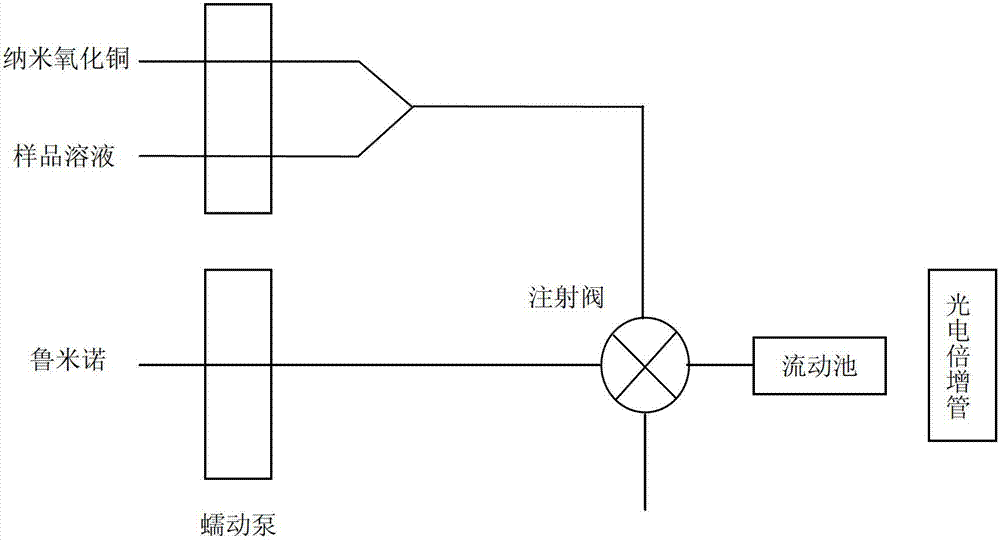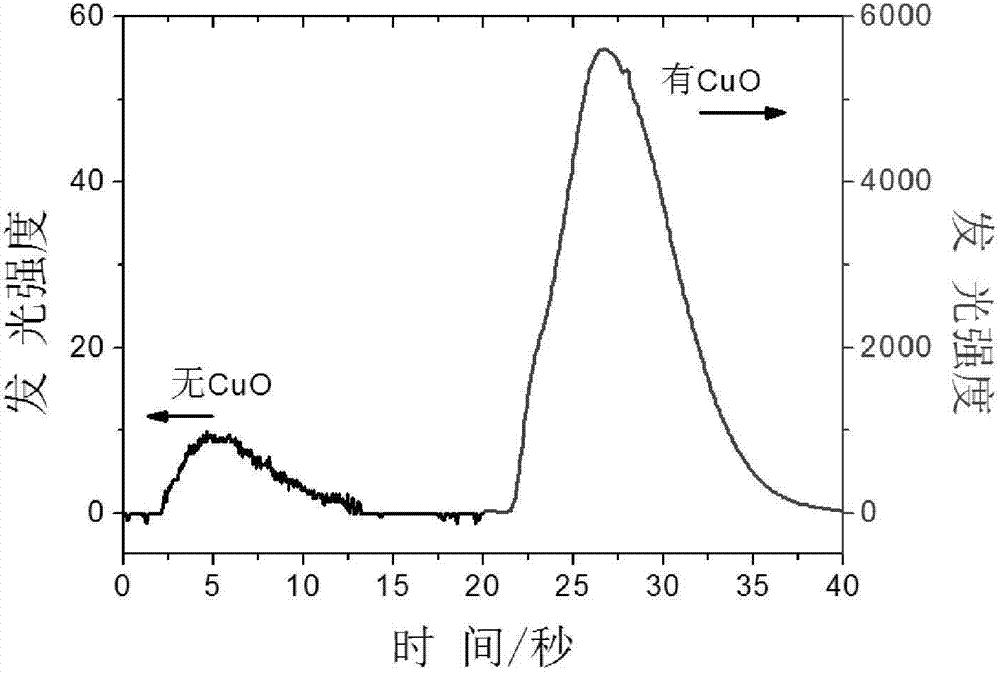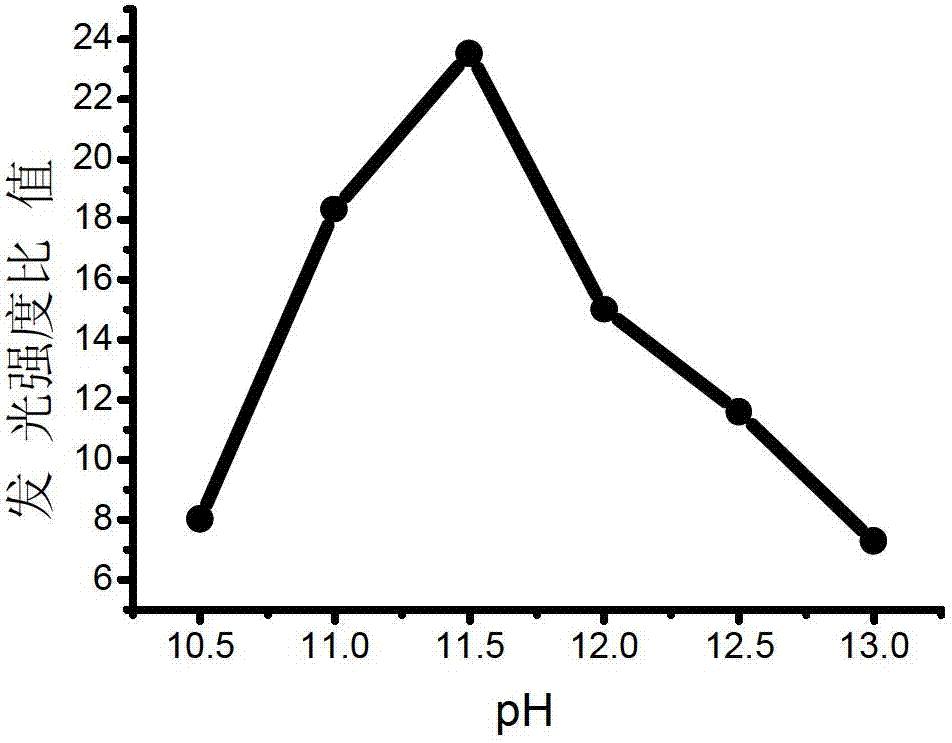Method for determining cholesterol by using flow injection chemiluminescence with nano-copper oxide as catalyst
A nano-copper oxide and chemiluminescence technology, which is applied in the field of analytical chemistry and nanometers, can solve problems such as poor specificity and selectivity, unstable reagents, and difficult standardization, and achieve good reproducibility, less sample demand, and high sensitivity. Effect
- Summary
- Abstract
- Description
- Claims
- Application Information
AI Technical Summary
Problems solved by technology
Method used
Image
Examples
Embodiment 1
[0049] Cholesterol was dissolved in isopropanol and Triton X-100 (18:7, V / V) to prepare a 5 mmol / L solution.
[0050] Add 62.5 μl of 5 mmol / L cholesterol solution, 25 μl of 27.7 U / ml cholesterol oxidase and 162.5 μl of 10 mmol / L phosphate buffer solution (pH 6.5) into the EP tube respectively, and incubate the mixture at 37°C for 10 minutes, and put the reaction The liquid was diluted 100 times, transported into the mixer by a peristaltic pump, mixed with a 1.0 mg / L nano-copper oxide colloid solution, and then mixed with a 0.2 mmol / L luminol solution (pH 11.5), and the three were mixed into the flow cell for reaction, resulting in The intensity of chemiluminescence was detected by a photomultiplier tube. In the blank control experiment, distilled water was used instead of the nano copper oxide colloidal solution. Such as figure 2 As shown, the nano-copper oxide can significantly enhance the chemiluminescence signal, and the enhancement factor is about 600.
Embodiment 2
[0052] Cholesterol was dissolved in isopropanol and Triton X-100 (18:7, V / V) to prepare a 5 mmol / L solution.
[0053] Add 62.5 μl of 5 mmol / L cholesterol solution, 25 μl of 27.7 U / ml cholesterol oxidase and 162.5 μl of 10 mmol / L phosphate buffer solution (pH 6.5) into the EP tube respectively, and incubate the mixture at 37°C for 10 minutes, and put the reaction The solution was diluted 100 times, transported by a peristaltic pump into a mixer and mixed with a 1.0 mg / L nano-copper oxide colloid solution, and then mixed with a 0.2 mmol / L luminol solution with different pH values (take values between 10.5 and 13). Mixed into the flow cell reaction, the intensity of chemiluminescence is detected by photomultiplier tube. Such as image 3 As shown, the ratio of chemiluminescence signal increases with the increase of pH and reaches the peak at pH 11.5, and the ratio of luminescence signal decreases when the pH value continues to increase.
Embodiment 3
[0055] Cholesterol was dissolved in isopropanol and Triton X-100 (18:7, V / V) to prepare a 5 mmol / L solution.
[0056] Add 62.5 μl of 5 mmol / L cholesterol solution, 25 μl of 27.7 U / ml cholesterol oxidase and 162.5 μl of 10 mmol / L phosphate buffer solution (pH 6.5) into the EP tube respectively, and incubate the mixture at 37°C for 10 minutes, and put the reaction The solution was diluted 100 times, transported by a peristaltic pump into the mixer and mixed with 1.0 mg / L nano copper oxide colloidal solution, and then mixed with different concentrations (take values between 0.01 and 1.0 mmol / L) of luminol solution (pH 11.5), The three are mixed into the flow cell for reaction, and the intensity of the generated chemiluminescence is detected by a photomultiplier tube. Such as Figure 4 As shown, the chemiluminescence signal increased with the increase of luminol concentration and reached the peak value at 0.2 mmol / L, and the luminescence signal decreased with the increase of lu...
PUM
 Login to View More
Login to View More Abstract
Description
Claims
Application Information
 Login to View More
Login to View More - R&D
- Intellectual Property
- Life Sciences
- Materials
- Tech Scout
- Unparalleled Data Quality
- Higher Quality Content
- 60% Fewer Hallucinations
Browse by: Latest US Patents, China's latest patents, Technical Efficacy Thesaurus, Application Domain, Technology Topic, Popular Technical Reports.
© 2025 PatSnap. All rights reserved.Legal|Privacy policy|Modern Slavery Act Transparency Statement|Sitemap|About US| Contact US: help@patsnap.com



